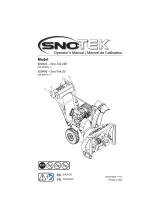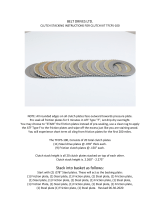
EN – 5
After striking a foreign object, stop the engine, remove the
wire from the spark plug, disconnect the cord on electric
motors, thoroughly inspect the snow thrower for any
damage, and repair the damage before restarting and
operating the snow thrower.
If the unit should start to vibrate abnormally, stop the
engine and check immediately for the cause. Vibration is
generally a warning of trouble.
Stop the engine whenever you leave the operating
position, before unclogging the auger / impeller housing or
discharge chute, and when making any repairs,
adjustments or inspections.
When cleaning, repairing or inspecting the snow thrower,
stop the engine and make certain the auger / impeller and
all moving parts have stopped. Disconnect the spark plug
wire and keep the wire away from the plug to prevent
someone from accidentally starting the engine.
Do not run the engine indoors, except when starting the
engine and for transporting the snow thrower in or out of
the building. Open the outside doors; exhaust fumes are
dangerous.
Never operate the snow thrower without proper guards,
and other safety protective devices in place and working.
Always stand clear of the discharge area when operating
this unit.
Never direct the discharge toward people or areas where
injury or property damage can occur from thrown objects.
Keep children and others away.
Do not overload the machine capacity by attempting to
clear snow at too fast a rate.
Never operate the machine at high transport speeds on
slippery surfaces. Look behind and use care when
operating in reverse.
Do not operate in reverse unless absolutely necessary.
Always back up slowly and look down and behind before
and while backing.
Do not carry passengers.
Disengage attachment when not in use and when
traveling from one work area to another.
Disengage power to the auger / impeller when snow
thrower is transported or not in use.
Use only attachments and accessories approved by the
manufacturer of the snow thrower (such as wheel weights,
counterweights or cabs).
This product is equipped with an internal combustion
engine. Do not use unit on or near any unimproved,
forest-covered or brush-covered land unless exhaust
system is equipped with a spark arrester meeting
applicable local, state or federal laws. A spark arrester, if
used, must be maintained in effective working order by
operator.
Never operate the snow thrower without good visibility or
light. Always be sure of your footing, and keep a firm hold
on the handles. Walk; never run.
Never operate unit after or during the use of medication,
drugs or alcohol. Safe operation requires complete and
unimpaired attention at all times.
Never allow anyone to operate this unit when their
alertness or coordination is impaired.
Never touch a hot engine or muffler.
Avoid contact with sharp edges; sharp edges can cut.
Do not throw snow higher than necessary.
Clearing a Clogged Discharge Chute
Hand contact with the rotating auger / impeller inside the
discharge chute is the most common cause of injury
associated with snow throwers. Never use your hand to
clean out the discharge chute.
To clear the chute:
1. SHUT THE ENGINE OFF!
2. Wait 10 seconds to be sure the auger / impeller
blades have stopped rotating.
3. Always use a clean-out tool, not your hands.
Maintenance and Storage
Secure unit so it will not tip over during maintenance.
Before cleaning, removing clogs or making any
inspections, repairs, etc., disengage clutch(es), stop
engine, remove key, allow moving parts to stop and hot
parts to cool.
Check shear bolts and other bolts at frequent intervals for
proper tightness to be sure the equipment is in safe
working condition.
Check clutch and brake operation frequently.
Do not change engine governor settings and do not over-
speed engine.
Adjust and service as required. Motion of drive wheels
and auger / impeller must stop quickly when clutch levers
are released.
Always maintain unit in safe operating condition.
Damaged or worn out muffler can cause fire or explosion.
Keep unit free of ice or other debris. Clean up oil or fuel
spills.
Always keep protective structures, guards, and panels in
good repair and secured in place. Never modify or remove
safety devices.
Never store the machine with fuel in the fuel tank inside a
building where ignition sources are present such as hot
water heaters, space heaters or clothes dryers. Close fuel
valve and allow the engine to cool completely before
storing in any enclosure or covering the unit.
























